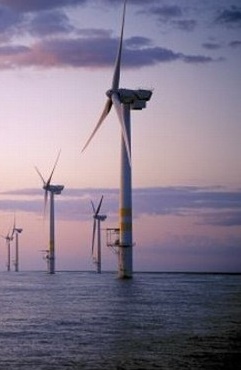Will offshore drilling ban spur wind development?
 Yesterday the Interior Department announced an updated strategy for offshore oil and gas leasing that bans drilling in federal waters off the Atlantic Coast and the Eastern Gulf of Mexico for the next seven years.
Yesterday the Interior Department announced an updated strategy for offshore oil and gas leasing that bans drilling in federal waters off the Atlantic Coast and the Eastern Gulf of Mexico for the next seven years."As a result of the Deepwater Horizon oil spill we learned a number of lessons, most importantly that we need to proceed with caution and focus on creating a more stringent regulatory regime," said Interior Secretary Ken Salazar. "As that regime continues to be developed and implemented, we have revised our initial March leasing strategy to focus and expend our critical resources on areas with leases that are currently active."
Noting that oil reserves off the coast of Virginia, the Carolinas, Georgia and northern Florida amount to just three months of supply at current U.S. consumption rates, the Southern Environmental Law Center praised the decision.
"The Chesapeake Bay, the Eastern Shore beaches, the fisheries, the state parks and wildlife refuges -- these are much too valuable to gamble away for a few weeks of oil," said SELC Attorney Deborah Murray. However, her group is concerned about the administration's plan to pursue underwater seismic studies in the Atlantic, which harm marine life.
At the same time, environmental advocates note that the new policy does not address the potential for drilling in state waters. In Florida, for example, the state House has already approved opening state waters three to 10 miles offshore to drilling rigs, though the bill was pulled from the Senate floor shortly before the Deepwater Horizon explosion. Polls have shown that a majority of Florida residents do not want oil rigs in state waters, and concerned Floridians are current collecting signatures on a petition calling for a constitutional ban on near-shore drilling.
Not surprisingly, the American Petroleum Institute criticized Interior's new drilling policy, charging that it could result in the loss of "tens of thousands" of American jobs. However, API does not account for the economic engines protected by the drilling ban: commercial fish landings, which in 2008 were valued at $262.8 million in Virginia, the Carolinas and Georgia, and coastal tourism, which in 2007 brought in $4.25 billion in Virginia alone.
The same day the Interior Department announced the drilling ban, the National Wildlife Federation released a report highlighting the potential of wind development along the East Coast -- a more environmentally sustainable alternative to oil and gas development, which pollutes and erodes sensitive coastal ecosystems.
The NWF found that up to six gigawatts of offshore wind projects have been proposed along the Atlantic seaboard -- the equivalent of about five coal-fired power plants and enough to power about 1.5 million average U.S. homes. It also pointed out that government analyses have found that the region has even greater possibilities, with the potential for over 212 gigawatts of wind resources in shallow waters.
To date, the Southeastern states have lagged behind their northern neighbors in terms of promoting renewable energy. For example, North Carolina's renewable energy standard would require the state's investor-owned utilities to generate only 12 percent of their power from renewable sources by 2021 compared to New Jersey's 22.5 percent.
Developing the region's renewable energy potential could generate jobs as well as more ecologically friendly energy. "Offshore wind development presents a tremendous job creation opportunity for America," said Stewart Acuff, chief of staff for the Utility Workers Union of America. "In these difficult economic times, offshore wind is perhaps the most promising game in town to grow quality, high-paying jobs here at home."
In North Carolina, the administration of Gov. Beverly Perdue (D) is already working to open coastal waters to wind power development. A spokesperson for the governor told the Charlotte Observer that the continued ban on drilling gives the state more time to look into the possibilities.
Tags
Sue Sturgis
Sue is the former editorial director of Facing South and the Institute for Southern Studies.
